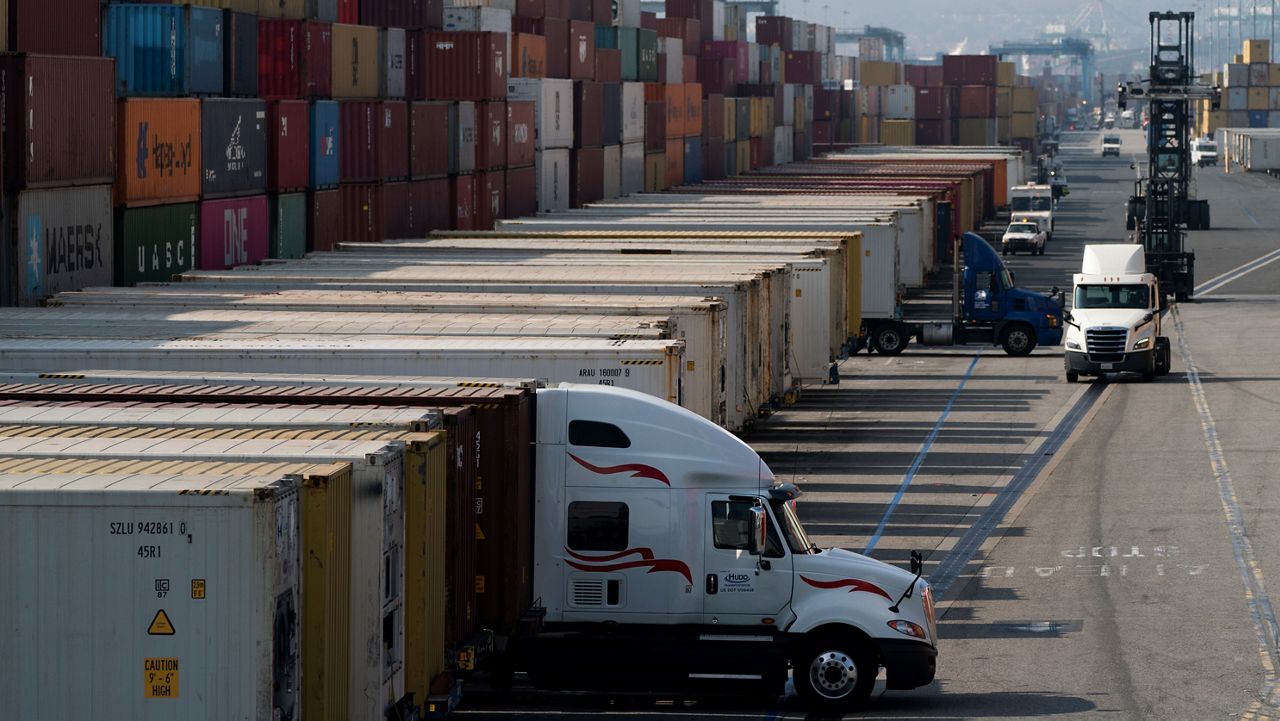LONG BEACH, Calif. — The Port of Long Beach is making good on the Green Port Plan it put in motion 17 years ago to completely transition to zero-emissions trucks by 2035. On Tuesday, port officials announced a multi-faceted partnership with the local freight business 4 Gen Logistics to help replace all of its diesel trucks with battery electrics in just three years.
“This is really the future of not just transportation but the future of our supply chain,” said Long Beach Mayor Robert Garcia. “It’s the future of what our ports are going to look like. And most importantly, it’s a better future for our communities that are going to see the incredible benefit of cleaner air, reduced emissions and the electrification of our entire country.”
Trucks are the single largest source of vehicular air pollution, according to the California Air Resources Board. They generate 70% of smog-causing pollution and 80% of carcinogenic diesel soot.
“We confidently placed orders for 61 zero-emissions trucks because it was the right thing to do,” said 4 Gen Logistics owner David Duncan. “And it was our customers that wanted it.”
The 80-year-old family trucking business purchased 41 battery electric big rigs from Volvo Trucks North America and another 20 from Kenworth to shuttle goods between the Port of Long Beach and the Inland Empire. Duncan said the company’s employee drivers helped the two truck manufacturers test early prototypes of their vehicles. By 2025, 4 Gen plans to have 100% zero emissions fleet — ten years before the state of California requires it.
It is now working with the EV charger company Electrify America to build 60 fast chargers at the Port of Long Beach and another 14 at its headquarters in Rialto.
It will also build a massive battery-energy storage system that enables it to store renewable energy during off-peak times and use it when the grid is under heavier loads. By early 2024, Duncan said, the company will operate a total of 90 charging stations as it strives to never again buy a truck with an internal combustion engine.
“Electrifying heavy- and medium-duty trucks like the thousands of drayage trucks that enter this port complex every day has the ability to make an immediate impact on air quality on local communities,” said Electrify America Director of Commercial Services and Business Development Rachel Moses.
Electrify America is the nation’s largest builder of electric vehicle charging infrastructure. Last year, it announced a $25 million investment in the Port of Long Beach and the Wilmington neighborhood of Los Angeles that includes 30 heavy-duty fast-chargers. When completed, it will be the largest charging station on port property in the United States.
The Port of Long Beach is the second busiest port in the nation, following the Port of Los Angeles. Handling over 8.1 million containers annually, the port is responsible for one third of all cargo moving through California ports. Its main imports are crude oil, electronics, plastics, furniture and clothing.
More than 22,000 trucks service the Port of Long Beach, but only a tiny fraction are zero emissions. That is expected to transition more rapidly beginning next year, when trucks at the port are required to update to more efficient engines and as more money collected from the Clean Truck Fund help freight operators pay to forego internal combustion trucks entirely in favor of zero-emissions models.
The Clean Truck Fund took effect in April, charging cargo owners $10 for every 20-foot loaded container unit they haul with a polluting diesel truck, or $20 for every loaded 40-foot unit. The program is expected to raise $90 million this year alone and will also help pay for the installation of heavy-duty battery chargers and hydrogen fueling infrastructure.
That fund will help the Port of Long Beach achieve the most aggressive zero-emissions targets of any port in the country. In addition to zero-emissions trucks, it plans to also completely transition its cargo handling equipment to zero emissions by 2030.
Seventeen percent of the cargo moving equipment at the Port of Long Beach is already zero emissions, Port of Long Beach Executive Director Mario Cordero said at Tuesday’s event.
“We are living the promise that we made in 2005 with the Green Port Policy that we’re going to transform this industry to a sustainable and green port,” Cordero said. “We’re on our way.”



